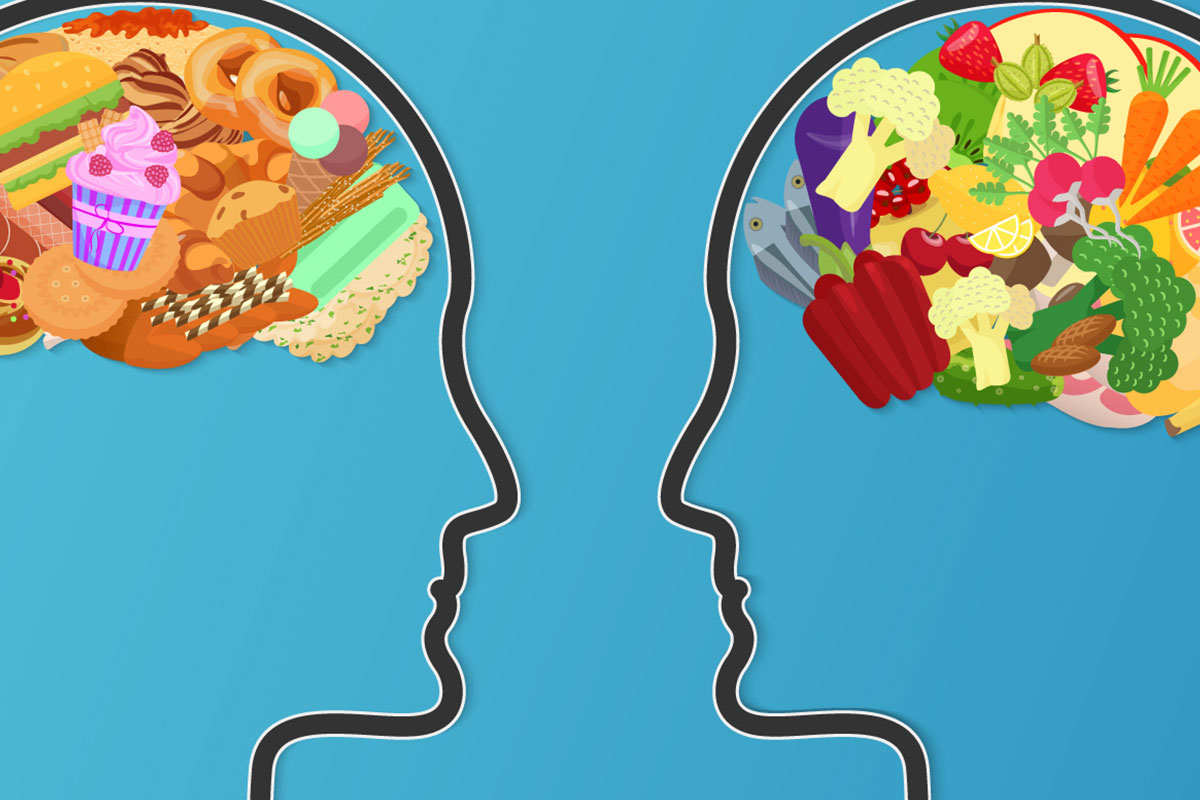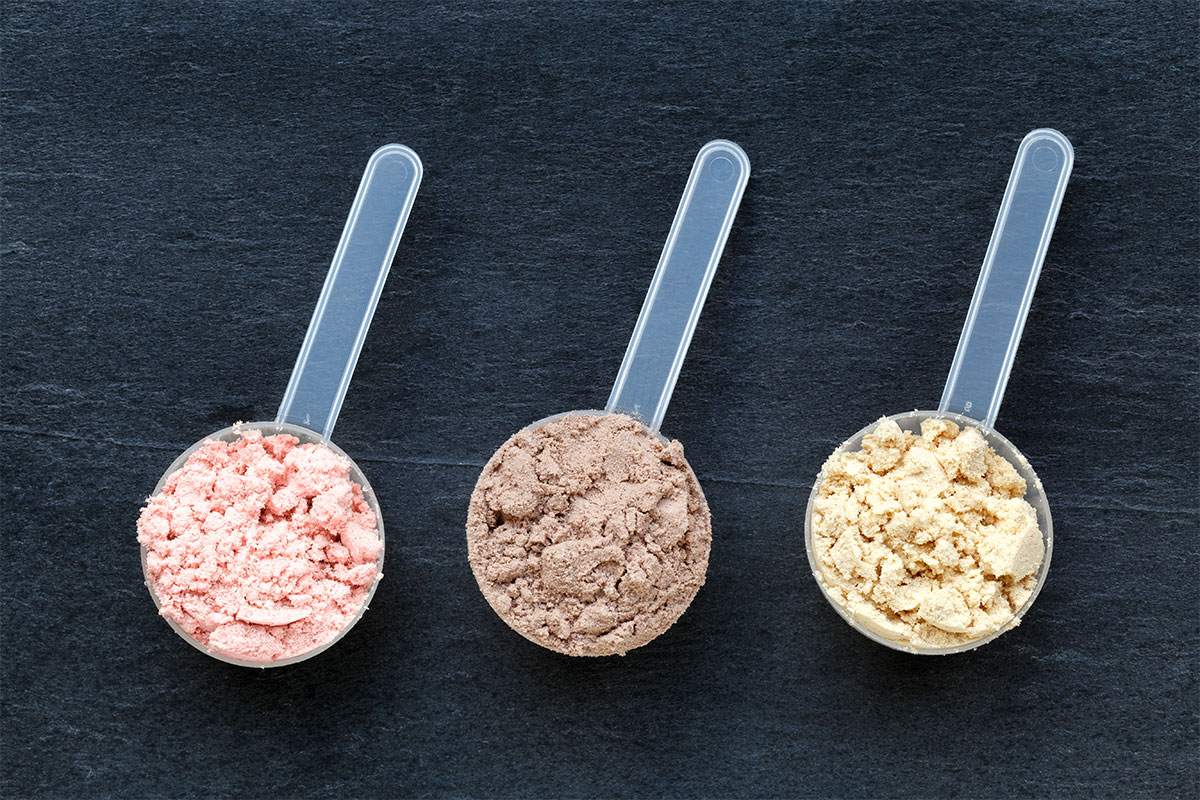Salt Grains for Muscle Gains?
Does liberally salting your food help you pump more iron in the gym? Registered Dietitian, Debbie James, investigates the claims!


Hello, I am a 45-year-old male. I’m in good shape but I’m wanting to drop body fat. I’m at about 19% and would like to get down to 15%. I was wondering in regard to my daily calorie limit, is it more important to watch the types of foods I eat or is it more important to stay under a certain number of calories?
– Adam

Well, since you are already in good shape with an ideal body fat percentage for your age, I’d say to you have to focus on both food choices and calorie limit to obtain further fat loss.
You can’t eat 1,500 calories of junk and expect to get definition! Limiting calories by itself will help lose weight, but you need to retain lean mass to get that body fat % down. Selecting healthier foods alone can keep you lean but you’d have to be super in tune with your satiety to create a calorie deficit on purpose.
Just for illustration: If your estimated energy needs for weight loss were 2,000 calories, then comprising that from 40% carbohydrate (mostly complex), 30% protein (up to 0.8 gm/lb. body weight) and 30% healthy fats would help achieve your goal.
Analysis on www.FitDay.com by a Registered Dietitian Nutritionist = 2060 calories, 41% carb, 26% prot, 33% fat
– Debbie J., MS, RD
This article should not replace any exercise program or restrictions, any dietary supplements or restrictions, or any other medical recommendations from your primary care physician. Before starting any exercise program or diet, make sure it is approved by your doctor.
Some questions have been edited for length and/or clarity.
 Have a nutrition question? Our registered dietitian is ready to help!
Have a nutrition question? Our registered dietitian is ready to help!
Email nutrition@lafitness.com or submit your question below and it may be featured in an upcoming article!
Does liberally salting your food help you pump more iron in the gym? Registered Dietitian, Debbie James, investigates the claims!
Debbie James, RDN, helps answer a question about energizing snack options to pull athletes through the second half of a high energy workout.
Registered Dietitian, Debbie James, helps answer a reader’s question about a good nutrition guide for a healthy pregnancy.


I heard that to lose weight bananas are not recommended. My go-to food to replenish energy, vitamins, and minerals is a banana and water after my work-out. Do you have any other recommendations?
– Josh A.

The notion that bananas are not good for weight loss probably stems from their slightly higher energy density and sugar content. However, that is only in context compared to other fruits! If you choose a banana over a granola bar, you might be saving on sugar and getting more micronutrients to boot.
One way to ‘balance’ the natural fruit sugars is to consume some nuts or protein with the banana. Perhaps add 20 almonds or an ounce of string cheese to the banana for your recovery snack. The net effect is a blunted rise in blood sugar over time versus a quicker spike. This would dampen the stimulus for fat storage, though your calories would go up because of the addition. If you are still put off by a banana, then consider swapping it for 2 plums or an orange for slightly less sugar and energy.
– Debbie J., MS, RD
This article should not replace any exercise program or restrictions, any dietary supplements or restrictions, or any other medical recommendations from your primary care physician. Before starting any exercise program or diet, make sure it is approved by your doctor.
Some questions have been edited for length and/or clarity.
 Have a nutrition question? Our registered dietitian is ready to help!
Have a nutrition question? Our registered dietitian is ready to help!
Email nutrition@lafitness.com or submit your question below and it may be featured in an upcoming article!
Does liberally salting your food help you pump more iron in the gym? Registered Dietitian, Debbie James, investigates the claims!
Debbie James, RDN, helps answer a question about energizing snack options to pull athletes through the second half of a high energy workout.
Registered Dietitian, Debbie James, helps answer a reader’s question about a good nutrition guide for a healthy pregnancy.


I am interested in lowering my blood sugar. Does taking cinnamon help?
– Marc W.

Just taking a supplement of an herb or spice is not a recommended treatment for lowering blood sugar.
In 2013, the American Diabetes Association indicated a lack of evidence to support the use of cinnamon for the treatment of diabetes.1 An article in Medical News Today noted that research is mixed yet suggests “cinnamon may help fight some symptoms of diabetes.2” The Diabetes Council indicates that the evidence to support the use of cinnamon to lower blood sugar levels is currently not strong.3
Overall, cinnamon may be a useful adjunct therapy tool for some people but is not a replacement for traditional diabetes treatments. Consult with your healthcare provider before trying any unprescribed diabetes remedies.
Sources:
– Debbie J., MS, RD
This article should not replace any exercise program or restrictions, any dietary supplements or restrictions, or any other medical recommendations from your primary care physician. Before starting any exercise program or diet, make sure it is approved by your doctor.
Some questions have been edited for length and/or clarity.
 Have a nutrition question? Our registered dietitian is ready to help!
Have a nutrition question? Our registered dietitian is ready to help!
Email nutrition@lafitness.com or submit your question below and it may be featured in an upcoming article!
Does liberally salting your food help you pump more iron in the gym? Registered Dietitian, Debbie James, investigates the claims!
Debbie James, RDN, helps answer a question about energizing snack options to pull athletes through the second half of a high energy workout.
Registered Dietitian, Debbie James, helps answer a reader’s question about a good nutrition guide for a healthy pregnancy.


My name is Kenton and I am 20 years old. I little bit of background: I swam for the University of the Pacific for 2 years but decided to take some time off from school to work and train. With Pacific I was training about 20 hours a week and I weighed 143 pounds at my heaviest. I have been weight training 4-5 times a week since January but currently weigh 140 lbs. My goal is to weigh around 155 pounds. Any advice would be amazing.
– Kenton Q.

I understand your weight goal is beyond your previous heaviest mark. That may take some doing! Further nutrition will only augment the weight training you are able to put towards that goal unless you want pure fat gain. (I’ll assume not.) As it’s not clear what your previous or current diet habits are, I can only offer general advice to put on lean mass.
First – increase nutrient density. Get the most out of every bite with high calorie and nutrient-packed choices. That means that dilute, air or water-filled choices take a back seat to heavier, and rich options. For example, eat oats or granola instead of puffed rice and choose ground meat patties over most fish fillets, except higher fat salmon, herring, mackerel or sardines. Tortillas can replace bread. Snack on dried fruits instead of melon. Fill half your plate with starchy vegetables like peas, corn, carrots and winter squash instead of watery vegetables such as onion, peppers, zucchini, and celery. Even higher sugar or fatty beverages like juices and whole milk help more than water for weight gain.
Second — eat a lot, eat often. Consuming more sheer volume boosts calories and usually offsets healthier (lower calorie) choices. When volume is limited, eating quickly before you feel full or splitting a meal in half to eat an hour or two later can mean getting in more bulk. When you think you’re done eating, push yourself to finish a couple more bites. Wait until after you eat to drink your beverage (and make sure it has calories, too.)
Third – time it right. Fuel your muscles properly pre- and post-workout to capitalize on the surge of hormones driving anabolism. The nutrition window to boost protein synthesis is considered about 30 minutes before and after weight training. Easy to digest lean proteins and low-fiber carbohydrates are the prime choices. Examples are egg whites, poultry breast, bagels, and pretzels. This is also when faster digesting liquid supplements have a leg up on solid food.
– Debbie J., MS, RD
This article should not replace any exercise program or restrictions, any dietary supplements or restrictions, or any other medical recommendations from your primary care physician. Before starting any exercise program or diet, make sure it is approved by your doctor.
Some questions have been edited for length and/or clarity.
 Have a nutrition question? Our registered dietitian is ready to help!
Have a nutrition question? Our registered dietitian is ready to help!
Email nutrition@lafitness.com or submit your question below and it may be featured in an upcoming article!
Does liberally salting your food help you pump more iron in the gym? Registered Dietitian, Debbie James, investigates the claims!
Debbie James, RDN, helps answer a question about energizing snack options to pull athletes through the second half of a high energy workout.
Registered Dietitian, Debbie James, helps answer a reader’s question about a good nutrition guide for a healthy pregnancy.


I have been taking the protein powder below for 4-5 years. I was listening to something on the LA Fitness TV that said it is important to select the correct protein powder. I have a protein shake in the morning. I am about 107 lbs. I am working on lowering my cholesterol. Is there a protein powder I should be taking that will be better for me? https://www.vitacost.com/sunwarrior-warrior-blend-plant-based-organic-protein-vanilla
– Varsha P.

Compared to consuming whole animal food protein sources, vegan protein sources are better for lowering harmful blood lipids. When it comes to protein drinks, there may be less of a difference because supplements are generally very low in fat, often under 2 grams per 20 grams of protein. While dairy-based supplements may have some dietary cholesterol, either may contain insignificant saturated fat, which is the primary component that’s known to elevate cholesterol levels. Protein powders are a poor source of fiber, omega-3 fatty acids and plant sterols which are food compounds known to help reduce cholesterol levels.
If you’re limited to the vegan protein powder category, you may not want to stick with one specific supplement for life. As each source offers a different mix of essential amino acids, it’s best to cycle your proteins to get the full range of building blocks your cells require. Of course, you can do that with the whole food protein sources in your diet by getting a variety of legumes, beans, nuts, seeds and vegetables. Doing so will enable you to consume adequate fiber, omega-3 fatty acids and plan sterols needed for blood cholesterol reduction.
– Debbie J., MS, RD
This article should not replace any exercise program or restrictions, any dietary supplements or restrictions, or any other medical recommendations from your primary care physician. Before starting any exercise program or diet, make sure it is approved by your doctor.
Some questions have been edited for length and/or clarity.
 Have a nutrition question? Our registered dietitian is ready to help!
Have a nutrition question? Our registered dietitian is ready to help!
Email nutrition@lafitness.com or submit your question below and it may be featured in an upcoming article!
Does liberally salting your food help you pump more iron in the gym? Registered Dietitian, Debbie James, investigates the claims!
Debbie James, RDN, helps answer a question about energizing snack options to pull athletes through the second half of a high energy workout.
Registered Dietitian, Debbie James, helps answer a reader’s question about a good nutrition guide for a healthy pregnancy.
Be the first to know about exclusive
content, deals and promotions